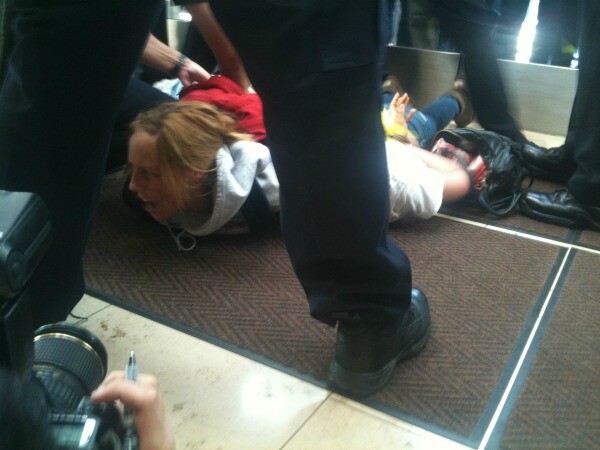Too Ocupado to Occupy

"Is this what the '60s was like?" I ask out of my cubicle to the reporters in the KPCC newsroom. It's Thursday of last week, the "Day of Action." Outside the station's downtown L.A. newsroom helicopters buzz mosquito-like. Just a few hours earlier protestors tried to shut down Figueroa Street and later trekked up to Bunker Hill to the financial district, to the banks that are the symbol of America. Tents sprung up like mushrooms on a lawn outside the Bank of America high-rise. The ensuing LAPD action to un-occupy the lawn played out like that signature LA television moment, the slow car chase. The helicopter television cameras high above didn't blink. I suppose the upside is that hundreds of thousands of people stared at the orange Alexander Calder sculpture longer than they've stared at any other work of art before.
There really was no answer to my question. Keyboards clattered, sprinting to meet newscast deadlines. None of us were old enough to put on a helmet for the Democratic convention in '68. I was born in the last year of that decade. I can't remember large protests like this on a national scale in the 25 years I've been working. This is as close I've come to seeing, feeling a national protest action.

On Wednesday I covered the violent clash between police and students at the Cal State University trustees meeting. Police had cleared the most vocal protesters from the meeting room just before trustees were to vote on a significant tuition increase. Six of 15 trustees at the meeting agreed with students that the tuition increase shouldn't be approved. Police moved and shoved protesters out the meeting room and past the building's glass doors. Protesters did everything to keep the doors open. Burly police used all their might to shut the doors. The glass door shattered into large crumb-sized pieces.
The next morning I talked to a lot of pissed off public university faculty and students who've had the fire of budget cuts slowly turned up and now they realize the pot's close to a boil. They were protesting at California State University Dominguez Hills for a one day strike organized by the union that represents professors. Faculty has been at odds with the university most of the year, asking for a ¼% salary increase. The administration, punched in the gut by Sacramento funding cuts held firm that the university can't afford it.

Faculty held up hand colored, retro flower power signs that read, "We teach the 99%." Students showed up to support their professors and complain about the rising cost of a college degree and the declining quality of a Cal State education. A New Orleans-style funeral marching band played for hundreds of protestors.
I filed my story and walked to the venerable Biltmore Hotel for the L.A. Press Club's National Entertainment Awards. My groovy profile of East LA musician Ruben Guevara was up for an award (I didn't win ?¹). Get this, Hugh Hefner was the Lifetime Achievement Award honoree. He walked in with several voluptuous blondes. Lakers owner Jerry Buss bought the table next to Hefner and brought an entourage to fill it. After accepting the award Hefner said he wanted to be remembered as a defender of the first amendment. The nearly 80 year old African American comedian Dick Gregory vouched for the honor. Before Hefner, he said, black comedians couldn't perform in mainstream, white clubs. Hefner joined the writing of greats such as Norman Mailer and Alex Haley with pictures of Playboy playmates. The honor included part of documentary on Hefner in which a late 1960s Joan Baez talks about the protest movement of the time. Hefter's curious about the opinion of young people and what they're protesting. We know how women will remember Hefner.
Which brings me to a related/unrelated topic, language and this occupy movement. I've been thinking about the word occupy and its Spanish counterpart, ocupar. They're both great grandchildren of the Latin word occupare, to seize. Ocupar means the same as occupy, to take over, seize, as in, "Vamos a ocupar el palacio municipal de Los Angeles." Let's occupy LA City Hall.
There are a few related Spanish versions that turn out to be false cousins. Ocupado means busy. As in, "El baño esta ocupado." The bathroom is busy. Ocupar also denotes need, as in, "¿Ocupas el taladro?" Do you need the drill?
The nation seems to be saying, we are all occupy. Just look at this brief list from an internet search of "occupy:"
Occupy Wall Street
Occupy LA
Occupy East LA College
Occupy Together
Occupy George
Occupy Everything
Occupy Edinburgh
Occupy Patriarchy
Occupy Columbus (1992 retro cool)
Occupy Sesame Street (isn't that Oscar's job)
Occupy Christchurch
I'll leave you with my contributions...
Occupy Gorditas (the food)
Occupy Dada
Occupy Libraries
Occupy Your Brain
Occupy Sonnets
Occupy Dictionaries
Poet and Journalist Adolfo Guzman-Lopez writes his column Movie Miento every week on KCET's SoCal Focus blog. It is a poetic exploration of Los Angeles history, Latino culture and the overall sense of place, darting across LA's physical and psychic borders.


